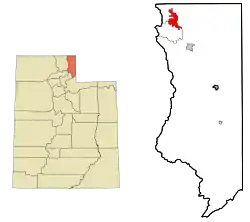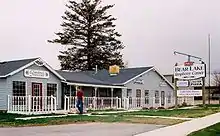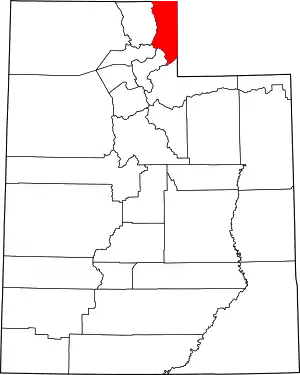Garden City, Utah
Garden City is a town in northwestern Rich County, Utah, United States. The population was 562 at the 2010 census. Garden City sits on the shores of Bear Lake and is a popular summer resort destination town, thus is nicknamed the "Caribbean of the Rockies."[5]
Garden City, Utah | |
|---|---|
 Garden City and Bear Lake | |
 Location in Rich County and the state of Utah | |
 Garden City, Utah Location in Rich County and the state of Utah | |
| Coordinates: 41°56′45″N 111°23′35″W | |
| Country | United States |
| State | Utah |
| County | Rich |
| Incorporated | 1934 |
| Area | |
| • Total | 8.78 sq mi (22.74 km2) |
| • Land | 8.78 sq mi (22.74 km2) |
| • Water | 0.00 sq mi (0.00 km2) |
| Elevation | 5,968 ft (1,819 m) |
| Population (2010) | |
| • Total | 562 |
| • Estimate (2019)[2] | 617 |
| • Density | 70.29/sq mi (27.14/km2) |
| Time zone | UTC-7 (Mountain (MST)) |
| • Summer (DST) | UTC-6 (MDT) |
| ZIP code | 84028 |
| Area code(s) | 435 |
| FIPS code | 49-27930[3] |
| GNIS feature ID | 1428133[4] |
History
Garden City was first settled in 1877 and an LDS branch was formed there at that time.[6] Two years later the town had grown into a ward.[7] In 1979, it merged with the neighboring town of Pickelville.
in 1903, Horatio Nelson Jackson and Sewall Crocker stopped in Garden City on the first automobile journey across the United States.[8]
Geography
According to the United States Census Bureau, the town has a total area of 4.5 square miles (11.7 km2), all land.
Climate
Garden City has a humid continental climate with warm summers (Köppen Dfb).
| Climate data for Garden City, Utah | |||||||||||||
|---|---|---|---|---|---|---|---|---|---|---|---|---|---|
| Month | Jan | Feb | Mar | Apr | May | Jun | Jul | Aug | Sep | Oct | Nov | Dec | Year |
| Record high °F (°C) | 59 (15) |
60 (16) |
70 (21) |
80 (27) |
87 (31) |
96 (36) |
95 (35) |
94 (34) |
90 (32) |
82 (28) |
68 (20) |
62 (17) |
96 (36) |
| Average high °F (°C) | 31 (−1) |
33 (1) |
43 (6) |
54 (12) |
63 (17) |
73 (23) |
81 (27) |
80 (27) |
70 (21) |
58 (14) |
42 (6) |
32 (0) |
55 (13) |
| Daily mean °F (°C) | 22 (−6) |
23 (−5) |
32.5 (0.3) |
42 (6) |
50 (10) |
58.5 (14.7) |
65.5 (18.6) |
64.5 (18.1) |
55.5 (13.1) |
45.5 (7.5) |
33 (1) |
24 (−4) |
43.0 (6.2) |
| Average low °F (°C) | 13 (−11) |
13 (−11) |
22 (−6) |
30 (−1) |
37 (3) |
44 (7) |
50 (10) |
49 (9) |
41 (5) |
33 (1) |
24 (−4) |
16 (−9) |
31 (−1) |
| Record low °F (°C) | −37 (−38) |
−34 (−37) |
−21 (−29) |
8 (−13) |
16 (−9) |
24 (−4) |
31 (−1) |
22 (−6) |
17 (−8) |
5 (−15) |
−17 (−27) |
−27 (−33) |
−37 (−38) |
| Average precipitation inches (cm) | 1 (2.54) |
1.05 (2.7) |
1.11 (2.8) |
1.45 (3.7) |
1.65 (4.2) |
1.05 (2.7) |
0.72 (1.8) |
0.89 (2.3) |
1.18 (3.0) |
1.26 (3.2) |
1.23 (3.1) |
1.05 (2.7) |
13.64 (34.6) |
Demographics
| Historical population | |||
|---|---|---|---|
| Census | Pop. | %± | |
| 1880 | 161 | — | |
| 1890 | 249 | 54.7% | |
| 1900 | 212 | −14.9% | |
| 1910 | 326 | 53.8% | |
| 1920 | 337 | 3.4% | |
| 1930 | 379 | 12.5% | |
| 1940 | 261 | −31.1% | |
| 1950 | 164 | −37.2% | |
| 1960 | 168 | 2.4% | |
| 1970 | 134 | −20.2% | |
| 1980 | 259 | 93.3% | |
| 1990 | 193 | −25.5% | |
| 2000 | 357 | 85.0% | |
| 2010 | 562 | 57.4% | |
| 2019 (est.) | 617 | [2] | 9.8% |
| U.S. Decennial Census[9] | |||

As of the census[3] of 2000, there were 357 people, 131 households, and 99 families residing in the town. The population density was 79.3 people per square mile (30.6/km2). There were 881 housing units at an average density of 195.6 per square mile (75.6/km2). The racial makeup of the town was 98.32% White, 0.28% Native American, 0.28% from other races, and 1.12% from two or more races. Hispanic or Latino of any race were 0.84% of the population.
There were 131 households, out of which 26.7% had children under the age of 18 living with them, 69.5% were married couples living together, 4.6% had a female householder with no husband present, and 23.7% were non-families. 19.1% of all households were made up of individuals, and 8.4% had someone living alone who was 65 years of age or older. The average household size was 2.69 and the average family size was 3.10.
In the town, the population was spread out, with 24.9% under the age of 18, 7.8% from 18 to 24, 20.4% from 25 to 44, 24.6% from 45 to 64, and 22.1% who were 65 years of age or older. The median age was 42 years. For every 100 females, there were 90.9 males. For every 100 females age 18 and over, there were 92.8 males.
The median income for a household in the town was $40,750, and the median income for a family was $56,250. Males had a median income of $45,833 versus $35,000 for females. The per capita income for the town was $20,206. About 2.7% of families and 9.6% of the population were below the poverty line, including none of those under age 18 and 12.5% of those age 65 or over.
See also
- List of cities and towns in Utah
- Pickelville, a former town that merged with Garden City
- Pickleville Playhouse, a musical theater in Garden City
References
- "2019 U.S. Gazetteer Files". United States Census Bureau. Retrieved August 7, 2020.
- "Population and Housing Unit Estimates". United States Census Bureau. May 24, 2020. Retrieved May 27, 2020.
- "U.S. Census website". United States Census Bureau. Retrieved 2008-01-31.
- "US Board on Geographic Names". United States Geological Survey. 2007-10-25. Retrieved 2008-01-31.
- http://www.gardencityut.us/
- The Utah Genealogical and Historical Magazine, Volumes 9-10. 1918. p. 181.
- Andrew Jensen. Encyclopedic History of the Church. p. 272
- http://www.sfgate.com/news/article/Long-before-the-interstates-there-was-a-Winton-2608886.php#page-3
- "Census of Population and Housing". Census.gov. Retrieved June 4, 2015.
External links
| Wikimedia Commons has media related to Garden City, Utah. |
| Wikivoyage has a travel guide for Garden City (Utah). |

